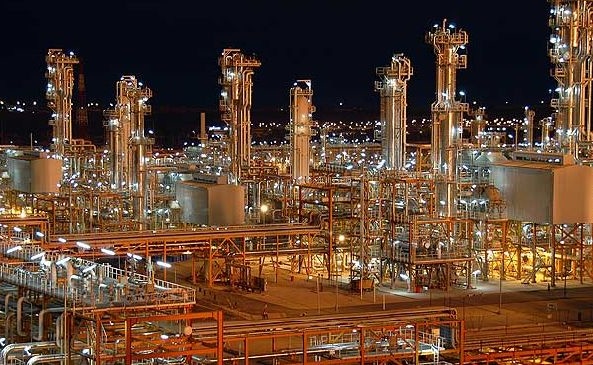LATEST: Zimbabwe Tells London Times About “Secret” Zimbabwean Deal To Sell Uranium To Tehran
Another day, another cheerleading article in the Iranian State media about the Islamic Republic’s oil and gas production:
A high-ranking Iranian energy official says the largest phase of the South Pars gas field will start yielding natural gas by the end of September.
Executive Director of Petropars Projects, Seyyed Hadi Mirbagheri, said on Thursday that the flare of the offshore platform of South Pars Phase 12 was lit in early August following the transmission of sweetened natural gas from onshore to offshore facilities….
Mirbagheri went on to say that the offshore platform of Phase 12 will yield 500 million cubic feet of natural gas per day in September, and will transfer the extracted gas to onshore facilities.
Needless to say, the reports do not mention the lengthy delays in bringing the production on-line, with a near-complete withdrawal of foreign investment and expertise since 2010. They merely restate former Minister of Oil Rustam Qassemi’s declaration that said all phases of the South Pars gas field, one of the largest in the world, will be operational by 2015.
Meanwhile, the latest report of the International Energy Agency highlighted the challenge for Iran’s oil production and exports.
On the surface, the news was good, with July exports rising to 1.16 million barrels per day from 960,000 bpd in June —- primarily because of an increase in purchases by China, Iran’s largest customer.
However, that figure is still only half of Iran’s foreign sales in 2012, and the IEA noted the challenge to return anywhere that level: only five countries — China, Japan, South Korea, Turkey, and the UAE — bought Iranian oil in July.
There was also a curious note about production in the report: despite the rise in exports, production fell slightly in the month, decreasing 50,000 bpd to 2.6 million bpd.
Zimbabwe Tells Times About “Secret” Zimbabwean Deal To Sell Uranium To Tehran
Saturday’s nuclear conspiracy story is brought to us — as it so often is — by The Times of London, who report on a top-secret deal by Zimbabwe to sell uranium (or, as AFP puts it ‘the raw materials needed to develop a nuclear weapon’) to Iran.
There is a flaw, however, with The Times’ exciting headline: apparently, the top-secret deal is so hush-hush that Zimbabwe’s Deputy Mining Minister is happy to reveal it to journalists:
“I have seen [a memorandum of understanding] to export uranium to the Iranians,” Zimbabwean Deputy Mining Minister Gift Chimanikire was quoted as saying.
Oh, Gift. “Secret” means you’re not supposed to tell anyone (and especially not journalists who have a habit of publishing things in newspapers).
AFP continues:
The agreement, which was reportedly signed last year, is likely to cause alarm in Western capitals.
Well, maybe — except that (a) Iran mines its own uranium, the very same uranium that it is currently enriching (though of course Iran says it’s not doing so to make a nuclear weapon); and (2) assuming Zimbabwe is telling the truth about the deal (which is questionable), if Chimanikire is so loose-lipped as to tell a Western reporter about the deal, it’s likely that the news has already leaked in one way or another and Western governments are aware of it.
But why would Chimanikire want to tell a Western reporter about the “deal” anyway?
Oh.
Chimanikire is a member of Zimbabwe’s opposition who is likely to be replaced now that the election has brought an end to the shaky coalition government.

